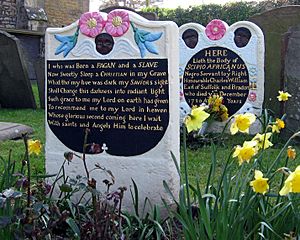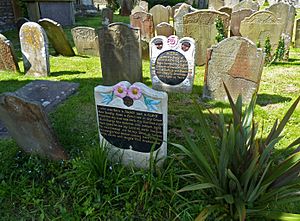Scipio Africanus (slave) facts for kids
Scipio Africanus lived a long time ago, from about 1702 to 1720. He was born in West Africa and was a former slave. He was named after a famous Roman general, Publius Cornelius Scipio Africanus, who won important battles against the Carthaginian leader Hannibal.
Scipio's Life Story
We don't know much about Scipio Africanus's early life. He lived in the home of Charles William Howard, the Earl of Suffolk, at a place called the "Great House" in Henbury, Bristol, England. Scipio was a former slave.
Historians think he might have been born into the household, perhaps as the son of an enslaved West African woman. Charles Howard likely gave him his name. Some people believe that giving him the name "Africanus" meant Howard planned to free him later for his good work. This idea comes from an old Roman historian named Polybius, who wrote that the Roman general Africanus sometimes freed people he had enslaved if they promised to work hard. Scipio Africanus died at the Great House when he was eighteen years old.
His Special Grave
Scipio Africanus is remembered because of his special grave in the churchyard of St Mary's Church in Henbury. His grave has a painted headstone and footstone. It is considered a very important historical site. Both stones show black cherubs, which are like small angels. The footstone has a poem written on it, called an epitaph:
I who was Born a PAGAN and a SLAVE
Now Sweetly Sleep a CHRISTIAN in my Grave
What tho' my hue was dark my SAVIORS sight
Shall Change this darkness into radiant light
Such grace to me my Lord on earth has given
To recommend me to my Lord in heaven
Whose glorious second coming here I wait
With saints and Angels Him to celebrate
In the early 1700s, about 10,000 black slaves and servants lived in Britain. However, Scipio's grave is one of the very few memorials that remember them. Even though his memorial is very well made, there is no official record of his burial in the church's old books.
In June 2020, the headstone of Scipio's grave was damaged. This happened around the same time that a statue of Edward Colston was also damaged by protesters. Both events caused a lot of discussion in the local area and across the country.
Scipio's Legacy
Scipio Africanus has been remembered in different ways:
- The author Eugene Byrne included Scipio Africanus in his 2001 novel Things Unborn. In this alternate history story, people who died too soon were reborn in a future England. In the book, Scipio Africanus became a famous war hero and a detective.
- The reggae band Black Roots from Bristol wrote a song about Scipio Africanus. They performed it live on a TV show called Rockers Roadshow in the 1980s. Their performance even included a short scene showing his grave.
See also
- List of slaves
 | Madam C. J. Walker |
 | Janet Emerson Bashen |
 | Annie Turnbo Malone |
 | Maggie L. Walker |



